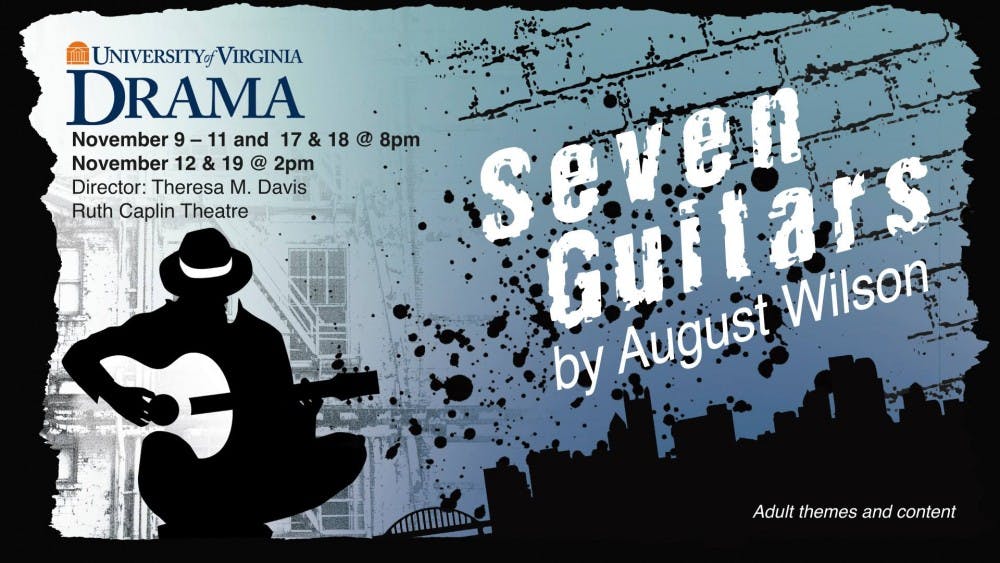All was quiet in the Ruth Caplin Theatre Thursday evening as the gathered audience prepared to witness the premiere of the University Drama Department’s run of August Wilson’s “Seven Guitars.” The venue is small — every seat was in close proximity to the stage, giving it an intimate quality which paired nicely with the nature of the play itself. Wilson’s lauded work provides a piercing glimpse into the lives of seven members of an African-American neighborhood in 1940s Pittsburgh, revealing their expansive dreams, exhausting fears and unspeakable secrets.
The play began subtly, as if to let the audience take in the set and immerse themselves in Pittsburgh’s Hill District. A house’s rear brick wall loomed onstage, a string of lightbulbs strewn across it. It protected a backyard from its urban surroundings, creating a haven of sorts stretching from the porch stairs to the gate. A collection of chairs was centered around a table spread with a meal. The members of the cast processed down the stairs into the yard, led by one woman’s voice crooning a blues melody of her own making, calling everyone to come and eat.
The cast, under the direction of Theresa M. Davis, associate professor in cross cultural performance, is composed of undergraduate and graduate students in the University Drama Department, as well as several guest actors. Once settled onstage, the characters immediately launched into intent conversation, giving the audience a feel for their relationship dynamics.
The singing woman — played by guest actress Leslie M. Scott-Jones — is the outspoken, matriarchal Louise, who lives in one of the house’s apartments with her level-headed neighbor Vera, played by graduate College student Chiquita Melvin. Guest actor Richard Cooper plays Louise’s aging, eccentric tenant, Hedley, and fourth-year College student Branika Scott is her seductive niece, Ruby. Guest actor Brandon Lee and fourth-year College student Jordan Maia round out the group as the charming Red Carter and sweet, imaginative Canewell, respectively. All of them have assembled to mourn the untimely death of their friend, Floyd Barton, a blues musician on the verge of making it big — played by graduate College student Kevin Minor.
The majority of the play consisted of a prolonged flashback, revealing the events leading up to Floyd’s death. Finally released from jail on corrupt vagrancy charges, all Floyd wants to do is reconcile with his ex-girlfriend Vera, retrieve his prized guitar from the pawn shop and head to Chicago to record his songs, swearing that this time, he’s never coming back. However, all of his attempts at self-improvement are thwarted.
Graduate College student Kevin Minor delivered a vibrant performance as Floyd, conveying his hotheadedness, frustrations and insecurities with intensity. The audience knew that his days were numbered, making his desperate plans all the more poignant.
“I am going to Chicago,” Floyd said at his breaking point. “If I have to buy me a graveyard and kill everybody I see. I am going Chicago. I don’t want to live my life without. Everybody I know live without. I don’t want to do that. I want to live with.”
Melvin portrayed Vera’s shattered heart and guarded exterior with grace. Some of the most compelling scenes were between her and Minor, as they tried to salvage the remains of their old relationship and move forward together.
The immobility of the characters was highlighted by the constancy of the set itself — every scene took place in the same backyard. Menial conversations — gossip, arguments and philosophical musings — took precedence in this play, serving as the lens to view the characters’ desires. Their idle remarks often related to the finiteness of time, which was suspended like a weight over the characters’ heads as they remained unable to set their goals in motion.
Cooper displayed this sense of urgency in his portrayal of the unhinged Hedley. In one of his many prophetic rants, he proclaimed, “Everybody got a time coming. Nobody can’t say that they don’t have a time coming.” His foreboding statement was revisited throughout the performance, and ultimately proved all too true.
The Drama Department’s rendition of “Seven Guitars” was skillful and moving, and everything from the set to the lights to the pulsing blues rhythms infused in each scene added to the overall viewing experience. The cast told a story of love, friendship, injustice, despair and hope while reveling in the gravity of the everyday, and their haunting performance is worth seeing.
“Seven Guitars” will be showing Nov. 17 and 18 at 8 p.m. and Nov. 19 at 2 p.m. at the Ruth Caplin Theatre.





